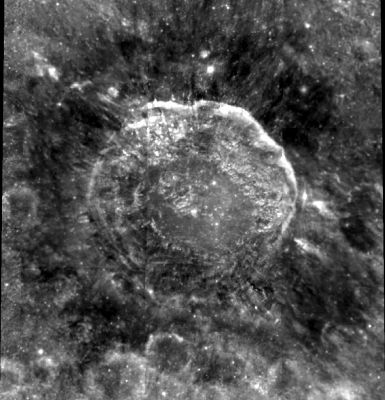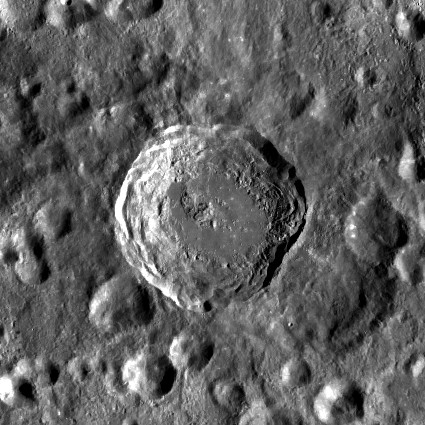Ohm
Contents
Ohm
|
Lat: 18.4°N, Long: 113.5°W, Diam: 64 km, Depth: km, Rükl: (farside), Copernican |
Table of Contents


left: Clementine . right: LROC
Images
LPOD Photo Gallery Lunar Orbiter Images
Maps
(LAC zone 53C3) USGS Digital Atlas PDF
Description
Fresh crater with impact melt dark collar and asymmetric rays indicating oblique impact. Melt in floor. Ohm's rays extend 1800 km to Aristarchus Plateau.
Description: Wikipedia
Additional Information
- Possible oblique impact – a dark collar (impact melt like Tycho) most evident to NNE, width 0.7 crater diameter. [Kirata et al LPSC 30: 1350]
- Central peak composition: GNTA1, GNTA2 & AG (Tompkins & Pieters, 1999)
- USGS Geology map I-1034 depicts this as an Eratosthenian age crater, but the bright and extensive ray pattern - perhaps not visible on the images they had 30 yrears ago - confirms this as being of Copernican age. - tychocrater tychocrater Oct 21, 2007
- TSI = 30, CPI = 15, FI = 20; MI =65 Smith and Hartnell, 1973
Nomenclature
Georg Simon Ohm (March 16, 1789 - July 6, 1854) was a German physicist. As a high school teacher, Ohm started his research with the recently invented electrochemical cell, invented by Italian Count Alessandro Volta. Using equipment of his own creation, Ohm determined that the current that flows through a wire is proportional to its cross sectional area and inversely proportional to its length or Ohm's law. Using the results of his experiments, Georg Simon Ohm was able to define the fundamental relationship among voltage, current, and resistance which represents the true beginning of electrical circuit analysis.
LPOD Articles
LROC Articles
Fractures in Ohm's melt pond
Big Ohm boulder
Bibliography
This page has been edited 1 times. The last modification was made by - tychocrater tychocrater on Jun 13, 2009 3:24 pm - afx3u2